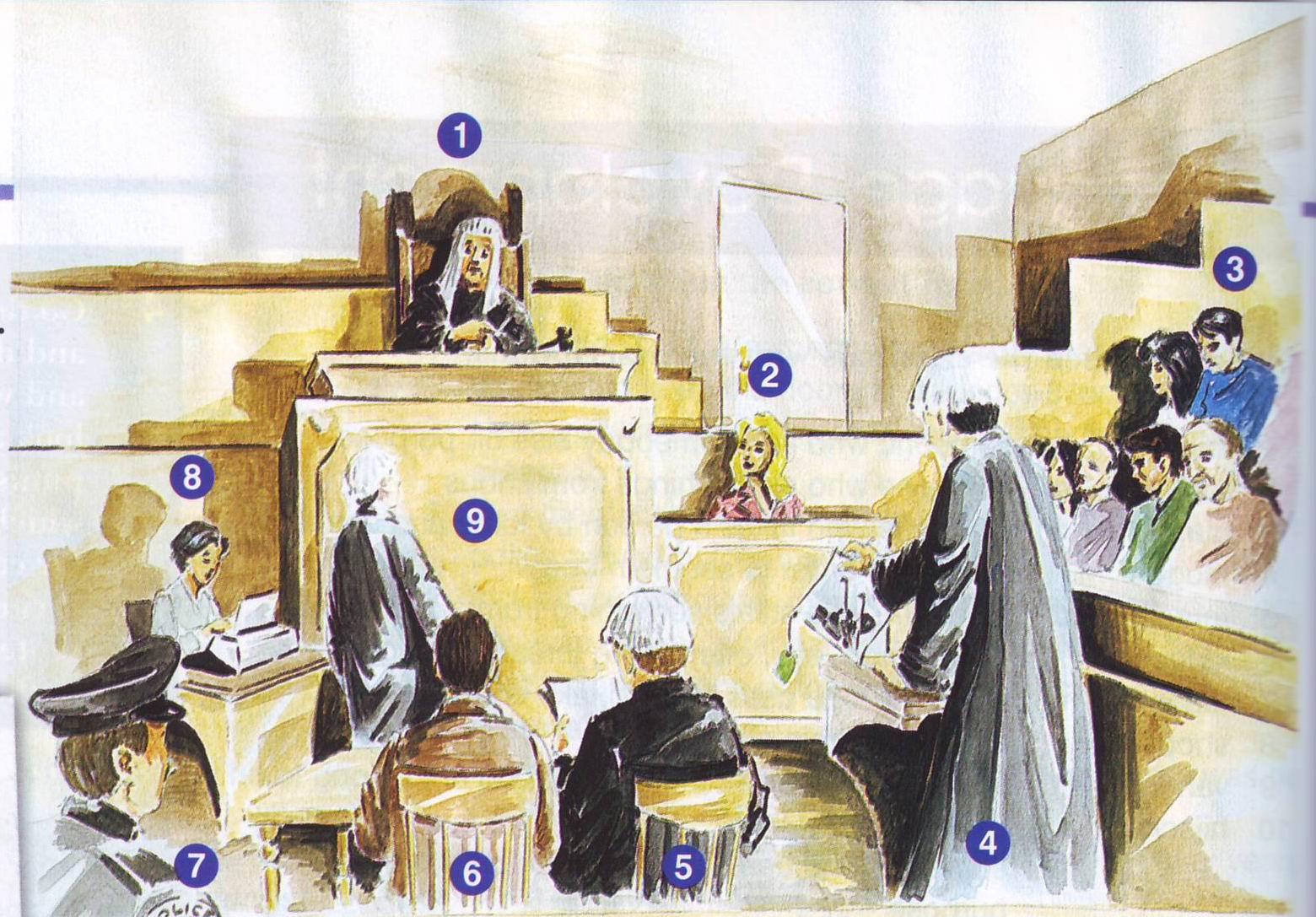МИНИСТЕРСТВО ОБЩЕГО И ПРОФЕССИОНАЛЬНОГО ОБРАЗОВАНИЯ
СВЕРДЛОВСКОЙ ОБЛАСТИ
ГОСУДАРСТВЕННОЕ АВТОНОМНОЕ ПРОФЕССИОНАЛЬНОЕ ОБРАЗОВАТЕЛЬНОЕ УЧРЕЖДЕНИЕ СВЕРДЛОВСКОЙ ОБЛАСТИ
«ПЕРВОУРАЛЬСКИЙ МЕТАЛЛУРГИЧЕСКИЙ КОЛЛЕДЖ»
УТВЕРЖДЕНО
Протокол методического совета
от «____ »_______ 2015 г. № _________________ /Л.В.Чачина/
Специальность среднего профессионального образования
40.02.01 Право и организация социального обеспечения (базовый уровень)
ОГСЭ.03. «Иностранный язык» (английский)»
"My future profession"
Учебное пособие по английскому языку
Составитель:
Горшкова Н.К.
Преподаватель ВКК
РЕКОМЕНДОВАНО
Протокол заседания ЦК МП
от «__» _________ 2015 г. № __
Председатель ЦК
____________ (_____________)
 2015
2015
 Содержание: стр.
Содержание: стр.
Пояснительная записка………………………………………………………….. 3
Раздел первый LOW PROFESSIONS ……………………………………………5
text 1 The Prosecutor's Office …………………...………………. ……………….5
text 2 The Bar ………………………………………………….….. ………………6
text 3 Notary Service ……………………………………………………………….7
text 4The Police ………... ………………………………………………………….7
text 5 History of the police in Great Britain and the USA ……….............................8
text 6 Solicitors and Barristers…………………………………….. ……………….9
test ………………………………………………………………………………….10
литература ……………………………………………………….. ……………….12
УВАЖАЕМЫЙ СТУДЕНТ!
Данное учебное пособие «Моя будущая профессия» разработано с целью приобретения и закрепления знаний и практических умений студентов:
углубления и расширения лексического запаса;
развития умений переводить тексты по специальности;
развития коммуникативных навыков;
развития познавательных способностей и активности студентов: творческой инициативы, самостоятельности, организованности;
формирования самостоятельности мышления, способностей к саморазвитию и самоорганизации.
Выполнение заданий учебного пособия, позволит Вам освоить знания и умения необходимые для формирования общих компетенций:
ОК 1. Понимать сущность и социальную значимость своей будущей профессии, проявлять к ней устойчивый интерес.
ОК 2. Организовывать собственную деятельность, выбирать типовые методы и способы выполнения профессиональных задач, оценивать их эффективность и качество.
ОК 4. Осуществлять поиск и использование информации, необходимой для эффективного выполнения профессиональных задач, профессионального и личностного развития.
ОК 5. Использовать информационно-коммуникационные технологии в профессиональной деятельности.
ОК 6. Работать в коллективе и команде, эффективно общаться с коллегами, руководством, потребителями.
ОК 8. Самостоятельно определять задачи профессионального и личностного развития, заниматься самообразованием, осознанно планировать повышение квалификации.
ОК 9. Ориентироваться в условиях частой смены технологий в профессиональной деятельности.
ОК 12. Соблюдать деловой этикет, культуру и психологические основы общения, нормы и правила поведения.
ОК 13. Проявлять нетерпимость к коррупционному поведению.
Данное пособие рассчитано на 14 учебных часов.
Учебное пособие состоит из одного раздела, посвящённого теме «Юридические профессии». Изучив его, студенты познакомятся с различной спецификой юридических профессий, их функционалом в России и за рубежом.
Тексты взяты из научной и научно-публицистической литературы, которые подверглись сокращениям и адаптации.
Работа над текстами и упражнениями, выполняемыми студентами самостоятельно (индивидуально), обозначены значком
Критерии оценивания устного высказывания
| Критерии оценки | Проявление признаков (0-2) |
| Признаки общих компетенций |
|
прочность знаний ранее изученных грамматических тем; |
|
текст пересказа последовательный, логически выстроенный; |
|
умение вести диалог, обосновывать собственную точку зрения; |
|
применение знаний и умений выше программного материала |
|
владение новыми языковыми знаниями и правилами выполнения речевых поступков (знание лексики) |
|
| Итого |
|
0 - признак не проявился
1- признак частично проявился
2- признак проявился в полном объеме
Соответственно: 10 - 9 балла – оценка «5»;
8 –7 балла – оценка«4»;
6 – 5 баллов –оценка «3»;
Менее 4 баллов –оценка «2».
Желаю удачи!
UNIT 1. LAW PROFESSIONS.
Task 1. Using the words from the list, label the picture. Then match each word with the definitions.
1. judge 2.witness 3.jury 4.defense lawyer 5.junior defense lawyer 6.the accused 7.policeman 8.court reporter 9.prosecutor

a) somebody who has been charged with committing a crime
b) a professional who decides how a criminal should be punished
c) a professional who speaks for the accused and advises him/her in court
d) somebody who has seen a crime happen
e) a professional who assists the lawyer of the accused
f) a group of people in court who decide whether somebody is innocent or guilty
g) somebody whose job is to deter people from committing crimes and to arrest those who break the law
h) a professional who represents the state in court
i) somebody who notes down what is said in court
Task 2. Используя данную лексику переведите предложения, обращая внимание на времена английского глагола:
to conduct the proceeding – вести судебный процесс
to conduct the case- вести дело (о правонарушении)
to participate in a trial- принять участие в судебном разбирательстве
to give advice on legal matters- давать советы по юридическим вопросам
to prepare legal documents- подготовит юридические документы
to investigate and to examine evidences -собрать и изучить доказательства
to observe\ to break the law- соблюдать/ нарушать закон
to try a serious crime in a superior court- рассматривать серьёзное преступление в высшем суде
to commit a crime- совершить преступление
to be innocent or guilty- быть невиновным или виновным
to arrest the accused- арестовать подозреваемого
to try the case- рассмотреть дело
to collect evidence – собрать доказательства
to get to the crime scene- добраться до места преступления
1) Судья сейчас ведёт судебный процесс. Он уже рассмотрел все доказательства преступления.
2) Этот свидетель вчера не принимал участия в судебном разбирательстве в 3 часа.
3) Адвокат будет вести это дело?
4) Поверенный подготовит все документы к следующему судебному заседанию?
5) Судья не даст совет по юридическим вопросам.
6) Полицейский уже собрал все доказательства. Вы их изучили?
7) Он часто нарушает закон.
8) Они завтра будут рассматривать это серьёзное преступление в Верховном суде в 2 часа?
9) Подозреваемый не совершал это преступление. Он не виновен.
10) Полицейский сказал, что он арестовал подозреваемого.
11) Криминалист только что собрал все улики/доказательства.
12) Суд рассмотрит это дело на следующей неделе.
13) Инспектор уже прибыл на место преступления?
Text 1.
Task 1. Read the text, translate it.
The Prosecutor's Office
The Prosecutor's Office in the tsarist Russia was established in 1722. The Russian Prosecutor's Office was founded in 1922. It exercises general supervision over observance of laws. Its main function is to see that all laws are correctly and uniformly applied throughout the country.
Any citizen of the Russian Federation can complain to the Prosecutor's Office against violation of his/her rights. A prosecutor also has the right to appeal against all unlawful decisions and actions of state organs and officials.
The Prosecutor's Office institutes criminal proceedings and investigates criminal cases. Investigators ascertain the circumstances under which crimes were committed, collect evidence against the perpetrators of crimes and their accomplices. Then courts try the cases submitting to them by the Prosecutor's Office, and the prosecutor brings a charge before the court in the name of the state. After the trial the prosecutor checks the sentences and judgments handed down by the court as to their legality. He has the right to enter any appeal if in his opinion the sentence or judgment is erroneous.
VOCABULARY
Prosecutor - Прокурор
exercise - осуществлять
supervision - наблюдение
observance - соблюдение
apply -обратиться
complain -жаловаться
violation of rights - нарушение прав
unlawful decisions - незаконные решения
institute - возбуждать (дело) (юрид.)
investigate - заниматься расследованиями
circumstance - обстоятельство
collect evidence -собрать доказательства
perpetrator -преступник
accomplice - сообщник
submitting to - передать
a charge - обвинительная речь
sentence -предложение
judgment -суждение
erroneous -ошибочный
Task 2. Answer the questions:
1) When was the Russian Prosecutor's Office founded?
2) What is its main function?
3) What proceedings does the Prosecutor's Office institute?
4) What is the role of the prosecutor on the trial?
5) Can the prosecutor enter any appeal in the case of erroneous sentence?
Text 2.
Task 1.Read the text, translate it.
The Bar
In accordance with the Constitution, the main task of the Bar is rendering legal assistance to citizens and organizations. The Bar promotes the protection of the lawful rights and interests of citizens and organizations, the administration of justice, the observance of laws.
Advocates are united into professional organizations - colleges of advocates (the Bar). A college is built on the principle of self-government, which means its right to decide its internal affairs independently.
Members of the Bar give advice on juridical matters, oral and written information on legislation, draw petitions, complaints and other legal documents; act as their clients' representatives in court, arbitration and other state organs for civil and administrative cases; participate in the preliminary investigation and in court in criminal cases as counsels for the defense; represent victims, plaintiffs, defendants.
As a rule, colleges have their own legal advice offices.
render legal assistance- оказыватьюридическую помощь
promote the protection of the lawful rights- способствовать защите законных прав
give advice on juridical matters -давать совет относительно юридических вопросов
draw petitions, complaint, legal documents-оформить ходатайство, жалобу, юридические документы
act as clients' representatives in court-действовать, как представитель клиента в суде
the defence - защита
victim -жертва
plaintiff -истец
defendant -ответчик
Task 2. Answer the questions:
1) Does the Bar render legal assistance only to organizations?
2) Are the advocates united into professional organizations?
3) What legal documents do the members of the Bar draw?
Text 3.
Task 1.Read the text, translate it.
Notary Service
There are many notary offices in our country. Their task is to check the legality of all transactions or documents they witness and to give legal advice and to render assistance to institutions, enterprises, organizations and individuals in protecting their legitimate interests. In doing so, notary offices establish identity, legal capacity and legal ability of the parties concerned, and the authenticity of their documents.
The notaries and the entire staff of the notary offices are bound to keep all the matters they handle or come across in performing their duties, professional secret.
Their duty also consists in helping applicants to make wills, in drawing deeds of gift, conveyance, purchase and sale. They attest wills, deeds and writings; verify copies of documents; certify translations of documents into foreign and native languages.
Besides, they make measures to guarantee the safety of the property left by deceased persons, and they issue certificates granting the right to inherit this property.
check the legality of all transactions or documents- проверять законность всех сделок или документов
give legal advice- дать юридическую консультацию
render assistance to institutions- помогать учреждениям
make wills -составить завещания
draw deeds of gift- оформить сделку дарения
conveyance -перевозка
purchase - покупка
sale - продажа
attest -засвидетельствовать
verify -проверить
certify - удостоверить
make measures to guarantee the safety of the property left by deceased persons-принять меры, чтобы гарантировать безопасность собственности, оставленной умершими лицами.
Task 2. Answer the questions:
1) Do notaries draw or check the legality of documents?
2) The notaries can give information about all the matters they handle or come across, is not it?
3) Does the notary draw wills, deeds and writings?
4) What is difference between the duties of an advocate and a notary? What is common?
Text 4.
Task 1. Read the text, translate it.
The Police
Police is the organization, which is responsible for the safety of the public. It must provide full degree of security for the society and its citizens.
The Russian Police was founded on the 10thof November, 1917. Its tasks are: to maintain public order; to combat, investigate and prevent crime; to protect personal safety of citizens; to protect state, public, municipal, private and other forms of property; to regulate traffic, etc.
The Police is now divided into the Criminal Police and the Service of Public Security.
When information about a committed crime is got, an investigative-operative group goes out to the crime scene. The group usually consists of an inspector on duty, an investigator, a field-criminalist, a medical expert. If necessary, some other experts join them.
At the crime scene members of the group find, collect and protect evidence (fingerprints, footprints and other traces of the criminal act) by means of investigative technique. They take pictures of the crime scene, make diagrams, etc. In short, they try to reconstruct the happening as to "what, when, how, why and who". The crime scene examination is usually ended with drawing up a record.
VOCABULARY
The safety -безопасность
maintain -поддерживать
investigate -расследовать
prevent -предотвращать
property -собственность
commit -совершать
the crime scene-место преступления
evidence -доказательства
drawing up a record- оформление протокола
Task 2. Answer the questions:
1) When was the Russian (Militia) Police founded?
2) What branches is the Police divided?
3) Name the members of investigative-operative group.
4) What is their duty?
5) What are functions of the Police?
Text5.
Task 1. Read the text and translate it using the dictionary.
History of the police in Great Britain and the USA
Police is a judicial and executive system, and an organized civil force for maintaining law and order and enforcing the laws.
There are traces to be found in every organized society of some system of rules for the maintenance at peace and order. At the same time, a system at police in the special modern sense of the term did not exist in ancient times.
In England, from the time of the Saxon kings, there had existed an organization of a partially voluntary character for the repression of crime and arrest of criminals, and the maintenance of good order. In 1828 Robert Peel (hence the term “Bobbie” or “Peeler” applied to the British, police) secured the passage of a stature creating the Metropolitan Police Force, and leading the way to the adoption of a uniform system for the whole country. The Metropolitan Police Force dates from 1829. Its office is New Scotland Yard; near the Houses of Parliament.
London is divided into four districts in charge of chief constables. Under the latter are the superintendents, most of them in charge of divisions embracing from 500 to 1.000 men. In rank follow the inspectors, the sergeants, and the constables.
In the USA, the English system was followed. In 1857 the State Legislature of Hew York copied the London plan, but in 1870 abandoned it in favor of local control. In New York City, the Police Department is under the supervision of a commissioner appointed for a term of five years; he may be removed by the mayor or by the Governor of the State. He has five deputies, also appointed by the mayor. The city is divided into 17 inspection districts, each in charge of an inspector, and the districts are divided into precincts, each in charge of a captain.
Task 2. Give the Russian for:
judicial and executive system, civil force, maintaining law and order, system of rules, maintenance of peace and order, system of police, repression of crime, arrest of criminals, maintenance of good order.
Task 3. Give the English for:
Гражданские войска, для поддержания правопорядка, обеспечивать соблюдение законов, система норм, в то же время, современный смысл (слова), частично добровольный, подавление преступлений, арест преступников, принятие всеобщей системы, в пользу чего, пять заместителей, назначаемый мэром.
Task 4. Маkе up word combinations. Use them in sentences of your own.
![]()
 a) judicial society
a) judicial society
executive system
organised
b) system local control police
sense criminals rules
organization the term
arrest of chief constables
maintenance divisions
in charge good order
in favor an inspector
a captain
partially voluntary character
c) to divide into districts
precincts
d) to appoint by the mayor
the governor
Task 5. Translate into English:
1) В Англии с 1829 существовала Центральная полицейская служба. Это была организация частично добровольного характера для подавления преступления и ареста преступников. Её офис был в Нью-Скотленд-Ярде, а возглавлял его Начальник констеблей.
2) В США последовали английской системе. С 1870 существовало Полицейское управление под руководством специального уполномоченного, который имел пять заместителей.
Text 6.
Task 1. Read and translate the text using the dictionary.
Solicitors and Barristers
England is unique in having two different kinds of lawyers. They are solicitors and barristers.
If a person has a legal problem, he goes to see a solicitor. Almost every town has at least one. In fact, there are about 60,000 solicitors in Britain.
Many problems are dealt with exclusively by a solicitor. For instance, the solicitor deals with petty crimes and some matrimonial matters in magistrates’ courts. He prepares the case and the evidence. He may represent his client in the lower courts. In a civil action, he can speak in the county court, when the case is one of divorce or recovering some debts. Besides, a solicitor deals with other matters. He does the legal work involved in buying a house, he writes legal letters for you, he helps you to make a will, etc.
Barristers are different from solicitors. Barristers are experts in the interpretation of the law. They advise on really difficult points, and conduct legal proceedings in the higher courts. Barristers are rather remote figures. A barrister’s client can come to him only via a solicitor. Barristers do not have public offices in any street. They work in chambers, often in London. There are about 6,000 barristers in England. Usually only barristers can become judges in English courts.
Task 2. What is the difference between a solicitor and a barrister? Are there such professions in Russia?
Task 3. The legal training for solicitors (who provide general legal advice to clients) and barristers (who present cases in the upper courts) is different. The following short texts describe the stages of legal training, but they are mixed up. Put the steps into the correct order.
1. PRACTICE AND CONTINUING EDUCATION.
The next stage is to obtain a “tenancy”: becoming an assistant to a practicing barrister.
2. GETTING THE QUALIFICATIONS.
The next step is to acquire some legal training specific to the work of a barrister.
3. DEVELOPING PRACTICAL SKILLS
Next the intending solicitor has to enter a two-year training contract with a firm of solicitors to gain practical experience in a variety of areas of law.
4. GETTING THE TRAINING AND EXPERIENCE: PUPILAGE.
This is the “apprenticeship” served by trainee barristers, who are known as pupils. It usually takes a year and consists of a mixture of assisting and observing experienced barristers, as well as more practical experience.
5. GETTING THE ACADEMIC QUALIFICATIONS.
The quickest and most common route to qualification is by means of a qualifying law degree.
6. GETTING THE VOCATIONAL QUALIFICATIONS.
You will have to undertake the Legal Practice Course, which is the professional training for solicitors. The course teaches the practical application of the law to the needs of clients.
7. GETTING THE ACADEMIC QUALIFICATIONS.
The first part of training to become a barrister is known as the academic stage, which provides a general theoretical introduction to the law.
TEST
1.Note these functions to positions.
|
1. barrister 2. solicitor 3. notary 4. jury 5. judge 6. witness 7. prosecutor 8. policemen 9. investigator
| a) to render legal assistance to citizens and organizations. b) to help applicants to make wills, in drawing deeds of gift, conveyance, purchase and sale. c) represent the client in court. d) to collect evidence against the perpetrators of crimes. e)to prepare documents for the barrister. f)to conduct the proceeding. j) to check the legality of documents. h) to put questions to the parties and witnesses during the proceeding. i) to draw petitions, complaints and other legal documents. g) may be counsel for the plaintiff or for the defendant. k) in corporation with other persons to decide the truth of the case tried before the judge. l) to regulate traffic. m) to ascertain the circumstances under which crimes were committed . n) to protect personal safety of citizens. o) to check the legality of the sentences and judgments handed down by the court . p) are suspected of committing crimes and brought before the court. q) to protect state, public, municipal, private and other forms of property. r) to return a verdict. |
2. Translate the text. Use dictionary.
What is Interpol?
The International Criminal Police Organisation, or Interpol, was created to hinder the activities of criminals who were exploiting the relative freedom of borders between countries in the early part of the 20th century. For years, smugglers and thieves could commit crimes in one European country and escape across the border to gain immunity within a neighboring state, before any authorities could catch up with them.
The barriers of language, culture and distance can cause difficulty for police officers investigating criminal activity that spans one or more country, but Interpol can provide unbiased assistance that benefits most law enforcement agencies. Interpol deals only with international crime, so much of their work is focused on terrorism and organised crime, within areas such as drug trafficking, arms dealing, money laundering, human trafficking and high tech crime; all of which are carried out within criminal networks that span the globe. The information that the organisation gather from across the globe is available to law enforcement agencies within numerous databases, and it is the upkeep and collation of that intelligence that makes Interpol a vital part of the criminal investigation process in many countries.
Each member country has its own Interpol office, or National Central Bureau, which is staffed by the national police force – in the UK the bureau is part of the International Division of the NCIS. These bureaus form a point of contact for any foreign agency or government who wish to exchange or gather information on particular criminal activities. Contrary to belief, most Interpol officers are based within their country’s bureau and not traveling the world combating crime, but
nevertheless, the co-operation of each officer is vital to many international criminal investigations.
Литература:
Агабекян И.П. Практический английский для студентов-юристов. Из серии «Учебники и учебные пособия».Ростов н/Д: «Феникс», 2011-416 с.
Английский язык для юристов: учеб. пособие / И.Б. Абрамова, И.А. Ткаченко. –Братск : ГОУ ВПО «БрГУ», 2009. – 108 с
Артемьева О. А., Лицманенко Т. Н. UNIFORM POLICE. Полиция и порядок: Учебное пособие по английскому языку для студентов юридических специальностей. Тамбов: Изд-во Тамб. гос. техн. ун-та, 2002. 184 с.
Л.В. Бедрицкая, Л.И. Василевская, Г.Г. Карлова, Е.П. Колбаско, Г.И. Сидоренко. ОСНОВЫ ПРАВА. УЧРЕЖДЕНИЕ ОБРАЗОВАНИЯ «Белорусский государственный экономический университет». МИНСК 2009.-126 с.
21





 2015
2015 Содержание: стр.
Содержание: стр.



 a) judicial society
a) judicial society










